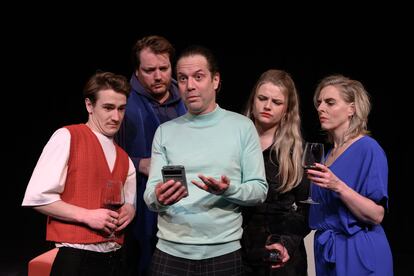“I don’t do anything. I don’t touch her. Football is about emotion and we’re happy,” says Leopold Steels, president of an imaginary Dutch women’s football team, when he is shown on a phone the sequence of the kiss on the mouth he has just given to one of the players, winners of a national championship. The victory has been a surprise and Leopold is delighted. Especially since the steel company on whose board he sits sponsors the sports team. “Have you not thought about consent?” asks his son, HJ. “We’re in a different era.” From then on, The kiss (The Kiss) the play directed by Erris van Ginkel for the independent company TG Toetssteen, recovers the echo of the conduct of the former president of the Royal Spanish Football Federation, Luis Rubiales, with the player Jenni Hermoso.
For Van Ginkel, the company’s artistic director, it all started when he saw on television what happened with Rubiales on August 20, at the Australia Stadium in Sydney, after the Spanish women’s team’s victory in the World Cup. “I’m a sports fan and it seemed strange to me. However, what is behind the kiss to the player Hermoso is the deep-rooted abuse of power against women,” he says, on the phone. He thinks that the situation was somewhat confusing at first, although he already had in mind the allegations of sexual harassment uncovered in January 2022 in the Dutch competition The Voice).
The musical competition, which originated in the Netherlands in 2010 and was adapted in other countries, including Spain, was temporarily suspended by the RTL television network. “The scandal changed the idea of sexual abuse on a national scale. The kiss, on the other hand, could initially be viewed differently,” says Van Ginkel. Writing the play was therefore “like peeling back the layers of a universal issue.” The author Roos Schlikker also participated in the playwriting. A Spanish adaptation of the play is planned for this October in Madrid.
The protagonist of The kiss He is a man who goes “from the initial euphoria of the players’ triumph to a crisis, and ends up losing everything,” explains the author, a few days before the company goes on stage on Friday in Amsterdam. It is the last performance before the summer break and the seats, arranged in the Badhuistheater, a former bathhouse, are full. Most are female spectators. “Although my character, Leopold (Harm Witteveen), is not Rubiales, he does not understand what he has done either,” says the playwright. “But this kiss thing is nothing. When we sang in the choir, they touched us everywhere, right?” says Fleur (Marieke Fransen), Leopold’s wife, at one point in the performance.
The Toetssteen theatre group is an independent company that performs mainly Dutch repertoire. It is more than 30 years old and started as an amateur ensemble. Van Ginkel says that working with this group allows him to put together productions very quickly. “This is very useful when there are burning social issues.” The kissreopens old family wounds and presents a personal breakdown and a generational clash with room for shouting, hugging and even punching. At first, Leopold is elated by the victory of the women’s team. Without warning, his brother Lammert (Carlo van Munster), an activist against polluting companies, arrives, shaken. The wives of both and HJ, Leopold’s son, with his girlfriend, complete the cast. The conflict over the kiss is compounded by sibling rivalries, the young man’s lament over the lack of paternal attention, the tension between the sisters-in-law, and the complaints about harmful emissions against Leopold’s steel company.

The pressure mounts throughout the night to the point that Leopold, cornered, ends up calling them all hypocrites. There is laughter and tears; the recurring presence of some terrible organic wines sold by Leopold’s wife; confessions of loves cut short by cowardice between Leopold and his sister-in-law, Bea (Linda Tordoir); a girlfriend (Carlijn Droppert) halfway between bewilderment and repulsion; and a multiple outburst of physical violence. The lights underline the action without interfering, and the music plays at the rhythm that the actors demand with their gestures. The blows of everyone against everyone, which end on the floor or crying, also serve as a catharsis. As if a crack were opened in an invisible wall through which reality penetrates: the steel company stops sponsoring the football club and Leopold loses everything.
Fade to black, and then, in the shadows, with the family scattered and battered, there is a hint of rapprochement between father and son (Jelle Ozinga). The young man remembers a happy moment in his childhood, when he went to the beach with his parents and everything was harmonious and promising for the future. What he doesn’t know is that his parents remember that day by the sea with equal intensity, although they didn’t know how to keep its light alive. The beach ball that the father carries at the beginning of the play, and throws to the spectators, reappears. In the misfortune, father and son remember the old day on the sand, stellar in its simplicity. Perhaps this part of their lives can be fixed. The ball reappears and is thrown back to the audience as the lights go out.

